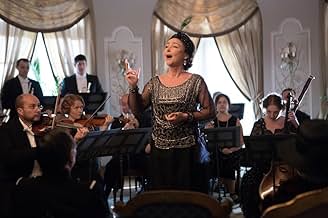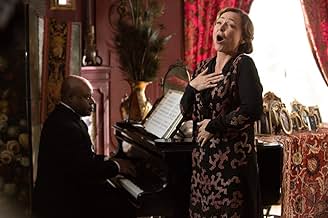È giorno di festa al castello di Marguerite Dumont. Canta con tutto il cuore, ma terribilmente stonata. Marguerite ha vissuto la sua passione nella sua bolla e il pubblico ipocrita si compor... Leggi tuttoÈ giorno di festa al castello di Marguerite Dumont. Canta con tutto il cuore, ma terribilmente stonata. Marguerite ha vissuto la sua passione nella sua bolla e il pubblico ipocrita si comporta come se fosse la diva che crede di essere.È giorno di festa al castello di Marguerite Dumont. Canta con tutto il cuore, ma terribilmente stonata. Marguerite ha vissuto la sua passione nella sua bolla e il pubblico ipocrita si comporta come se fosse la diva che crede di essere.
- Regia
- Sceneggiatura
- Star
- Premi
- 7 vittorie e 15 candidature totali
Recensioni in evidenza
Rather than give away too much of the plot; i'd would prefer to sing the praises of the panoply of elements that make this movie so memorable and commendable. It is beautifully staged and executed, with a faithful commitment to the period and a skillfully cast ensemble of actors to back the leading lady. I was especially impressed with Congolese actor Denis Mpunga who lends such a solid and fascinating literal support as Marguerite's butler. Michel Fau steals every scene he is in as an overly hammy opera singer; and Andre Marcon manages to both represent and challenge the archetype of a philandering husband.
While the film does run long; a shade over 2 hours; for the most part it is compelling, intriguing, amusing, sad and thought provoking. How many movies can be described that way? There were moments where I was both laughing and crying; a result of powerful direction by Xavier Giannoli who also co-wrote the film, and of course the impeccable performance from Catherine Frot. There is enormous dignity that the actress conveys as well as a hapless and at times a quiet knowing which is hugely endearing and makes Marguerite neither a victim nor a focus for ridicule. La Frot has such cinematic presence and yet at times there is great stillness to the performance; and of course there is the full bodied musical pieces that anchor the film's structure and themes.
There is a majesty to the film cinematically; and despite a couple of plot strands hastily thrown in and not satisfyingly completed, there is a potency and cogency to the script and to the film's overall running time. I feel it will be one of my favorites of 2016.
There are better biopics overall than 'Marguerite', and there is a preference for 2016's 'Florence Foster Jenkins', also about a notoriously bad singer and one of my personal favourites of 2016. However, it is very much a winner with many fantastic things.
'Marguerite' does fall too much in mawkish and slightly heavy-handed melodrama in the final act, and the aspiring young singer subplot doesn't slot into place as much as it should. Same with a few of the characters, some more interesting and serving more purpose to the story than others.
However, 'Marguerite's' pros far outweigh the cons, and when the film is at its best it's very good indeed and often even better than that. It's lovingly filmed and lavishly staged with gorgeous settings, scenery, colours and costumes that capture the era brilliantly and evocatively. The music is magnificent even when it's butchered.
Xavier Giannoli clearly put a lot of thought into the direction and handles the themes and any tone shifts and the numerous sub-plots often very well indeed, succeeding in keeping the story compelling and not feeling cluttered or too stretched. The script is intelligent with an ideal balance of humour and pathos, the humour very funny and the pathos heart-rending.
Like with 'Florence Foster Jenkins', it is easy making this sort of character interesting or easy to sympathise with and oddly wanting them to succeed. 'Marguerite' actually does a great job with that. This is also largely down to the lead performance of Catherine Frot, which is truly superb and captivates the viewer throughout the length. The rest of the performances are also very impressive, but it's Frot who lives in the memory the most.
On the whole, lavish, intelligent and absorbing, Frot and the production values particularly coming off well. With a stronger final act and more consistently with a couple of the sub-plots and the characters it could have been a wonderful film instead of an overall very good one. 8/10 Bethany Cox
I fell in love with all of the characters, even those who used Marguerite and those that tried to swindle her – they were just so well written and full of life. And you can't help but love those who supported and stood by her.
The ending was also surprisingly heart-wrenching, but fitting and sadly satisfying.
Lo sapevi?
- QuizThe name of the title character is a gallicised form of Margaret Dumont, the dignified lady with the figure of an old-time opera singer who was the foil for the Marx Brothers' gags.
- BlooperPlaced in Paris starting from September 1920, and with an almost faithful commitment to the period, except for the sequence when Marguerite, Baronne Dumont sings whilst motion picture images are first projected onto a white sheet and then onto her white clothing. Incorrectly there is the use of a 16mm silent movie film that appears to be projected from a 16mm film projector, however 16mm film was not invented by Eastman Kodak in the USA until 1923. In France in 1922 Pathé Frères invented their 9.5mm silent movie film as part of the Pathé Baby amateur film system, which would have been more likely to be in use in this era.
For the era the incorrect number countdown leader is projected, and any fully trained projectionist would notice the error, and in 1920 we see the 1965 "SMPTE Universal Leader" that was designed and used for television projection applications. Featuring a continuous countdown from eight to two (measured in seconds, rather than feet), with the numbers in the center of a target with two white circles and a rotating "clock arm" animation. "SMPTE Universal Leader" did not gain widespread acceptance theatrically which still used from 1930 "The Academy Leader", and from 1951 "The Society Leader" (both are 16 frames/foot in 35mm film), counting down from eleven to three, and a quick beep is heard at three, with all the numbers appearing upside down. The words 'SIX' and 'NINE' usually appear below their respective numbers.
The Academy leader is specified by SMPTE 301.[1]. The Universal Leader is specified by ANSI/SMPTE 55.
The Society [aka All-Purpose] Leader (1951) is quite complex in design, and is recognizable by its circles with slender arrows pointing to the sides, top, and bottom of each frame (akin to cross-hairs). The numbering is from 11 to 3, but oriented the correct way up, however the SIX and NINE appear as words only. The numbers are again spaced at one foot intervals, i.e. at every sixteenth frame, with 'echoes' of each number in the immediately adjacent frames (so each number actually appears thrice). The Universal [a.k.a. Television] Leader (1965) is the most widely recognized with the familiar 'clocksweep' animated graphic, and the numbering used is from 8 to 2 and with duration of precisely 8secs@24fps. All numbers are the correct way up, and are spaced at 24-frame (1 second) intervals. Since the number 9 has been eliminated, the 6 appears only as a numeral.
- Citazioni
Félicité la barbue: [Referring to Marguerite] There are only two ways to deal with life: dream it or live it.
- ConnessioniReferenced in Florence (2016)
I più visti
- How long is Marguerite?Powered by Alexa
Dettagli
- Data di uscita
- Paesi di origine
- Siti ufficiali
- Lingue
- Celebre anche come
- Madame Marguerite
- Luoghi delle riprese
- Aziende produttrici
- Vedi altri crediti dell’azienda su IMDbPro
Botteghino
- Budget
- 8.000.000 € (previsto)
- Lordo Stati Uniti e Canada
- 506.677 USD
- Fine settimana di apertura Stati Uniti e Canada
- 19.924 USD
- 13 mar 2016
- Lordo in tutto il mondo
- 8.754.356 USD
- Tempo di esecuzione
- 2h 9min(129 min)
- Colore
- Proporzioni
- 2.35 : 1































